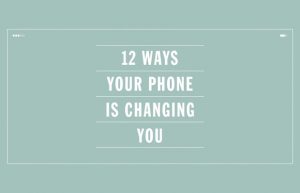Everyone is after the good life. The question about phone-influence then is, “How does the smart phone propel us toward the good life or away from the good life?” In chapters 1 and 12, Reinke warned that the phone can move us away from the good life by distracting our minds and stealing our time. Now, he alerts us to the smart-phones powers to disembody and enrage us—”Our phones push us to evade the limits of embodiment (chapter 2) and thereby cause us to treat one another harshly (chapter 11)” (189).
My wife and I were sitting around the breakfast table one morning with the kids. We had just finished reading about God’s creation of man. So I had everyone hold up their arms and pinch a little bit of that so easily-pinchable forearm skin. “What’s that?” I said as the kids giggled and a couple of the older ones raised their hands since they’ve heard this one before. “Dirt,” came the reply. You don’t get any greater honor than being created in the image of God. And there is no better reminder of our humble status than recalling that God made us from the dust (Genesis 2:7).
But we don’t like reminders about our humility. So we try to escape the limits of our bodies. The phone is our friend to that end. We overprioritize our easy, disembodied interactions in the online world to the neglect of our embodied ones (61). Time that could have been spent wrestling with the kids or visiting a friend in the hospital is squandered by flinging angry emoticons into cyber-space.
We tweet and type hateful words that we would not say if we were sitting down face to face. Our smart-phones provide quick and easy access for gossip and slander. Especially the kind that masquerades as truth telling and “righteously” withholds names, “And I thought she was a real friend (you know who you are) – Proverbs 17:17.”
How do we resist these twin evil-influences of the smart-phone? We need to embrace our flesh-and-blood embodiment and treat others with grace (190). Here are some ways to do so.
Remember what God has said about the physical world. God made us out of the ground and said, “It is good.” God made a physical world and said, “It is good.” Jesus the eternal God Himself “became flesh” (John 1:14). One day we will know the resurrection of our bodies (1 Corinthians 15). Jesus has been given both a heavenly and an earthly authority (Matthew 28:18).
Enjoy God’s good creation. Get out there and live in the world God made. In our modern technopoly, we experience what Andy Crouch calls “easy everywhere.” The temptation then is to remain seated inside and opt for the drone video of the Grand Canyon rather than the real one. The real one is better.
Make every effort to resolve conflict in person. Text messages and phone calls are good for some things. But, if your brother sins against you “go and tell him his fault” (Matthew 18:15). It may feel easier to apologize without being in the presence of the person we have wronged. At times such an apology might be necessary. But, the Bible places a premium of face to face, flesh-and-blood reconciliation.
Place great significance on your relationships in the local church. In the local church, we gather with other embodied believers. We sing, pray, embrace, listen, and encourage. We eat and drink at the Lord’s Table. We watch as new believers are baptized. In the local church, our hardened and overly-confident opinions get refined. In the local assembly, we don’t present ourselves in high-resolution, airbrushed headshots. Our very gathering in time and space is an acknowledgement of our physical limitations. The local church keeps us humble as we are known and loved in flesh and blood.


























